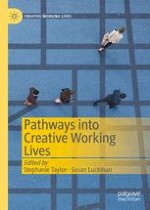2020 | OriginalPaper | Chapter
14. Cities’ Hope Labour in Insecure Times: On Aspiring Creative Industries, Travelling Expectations and Aesthetic Pedagogies
Author : Marguerite van den Berg
Published in: Pathways into Creative Working Lives
Publisher: Springer International Publishing
Activate our intelligent search to find suitable subject content or patents.
Select sections of text to find matching patents with Artificial Intelligence. powered by
Select sections of text to find additional relevant content using AI-assisted search. powered by
